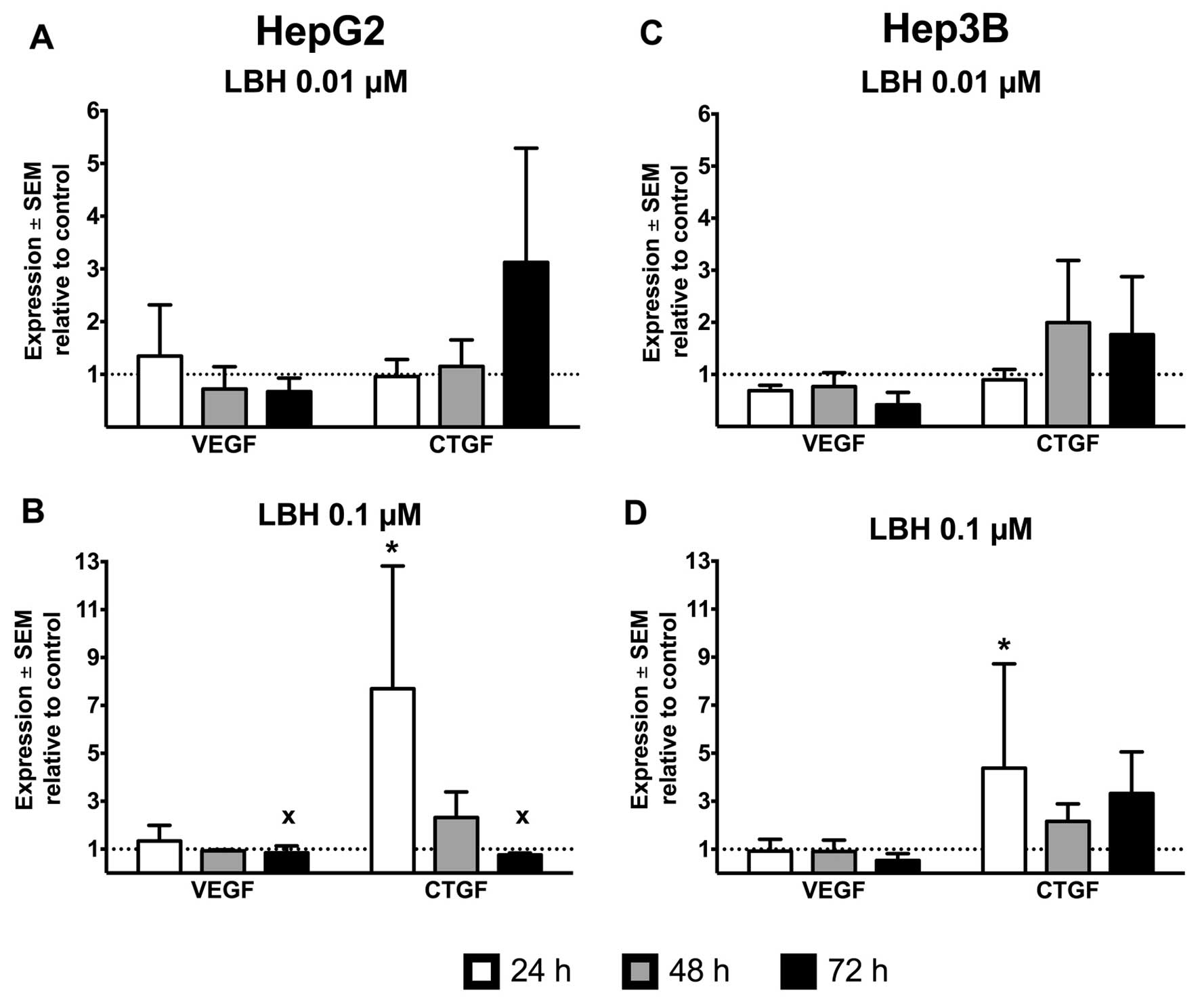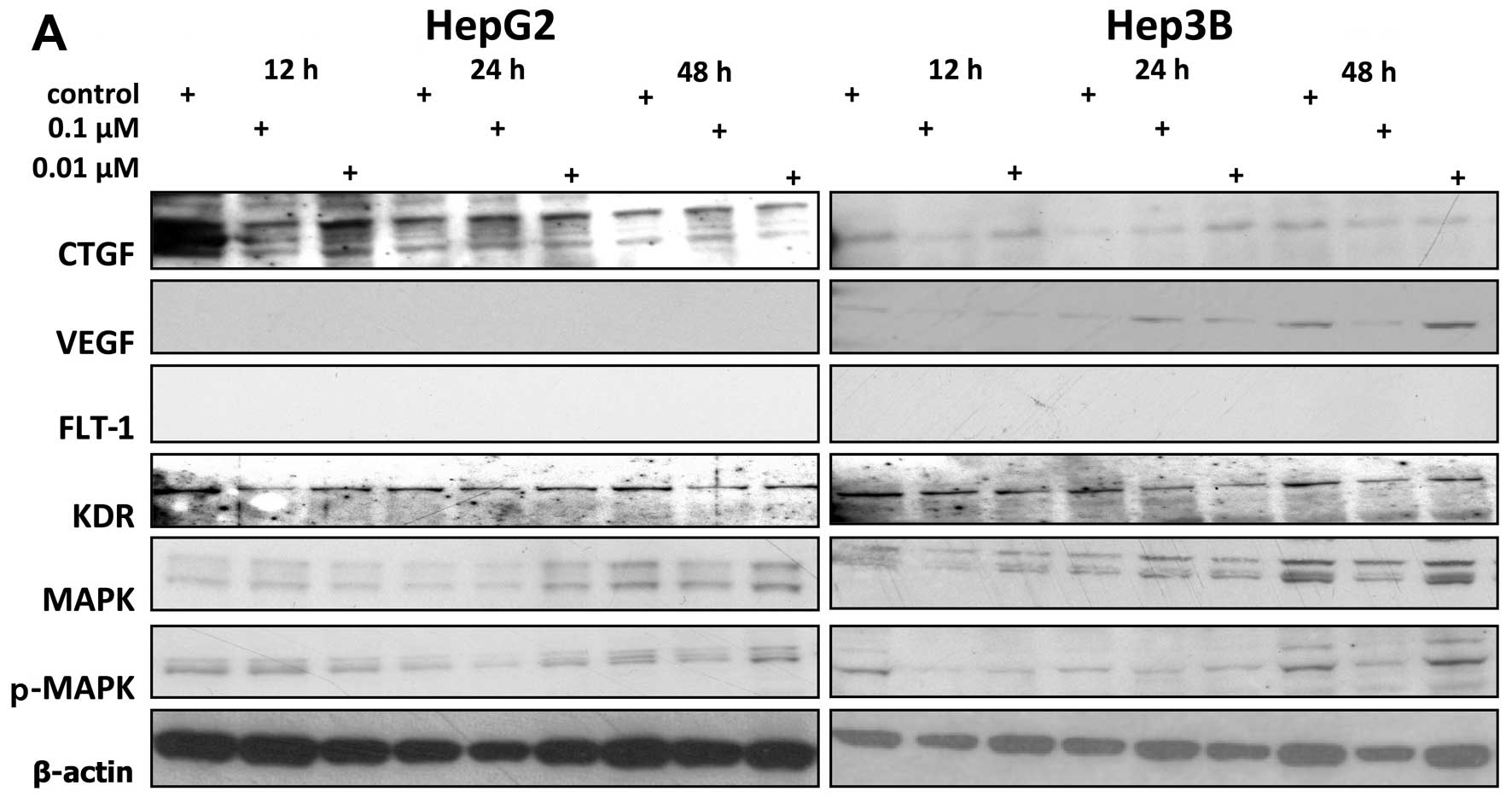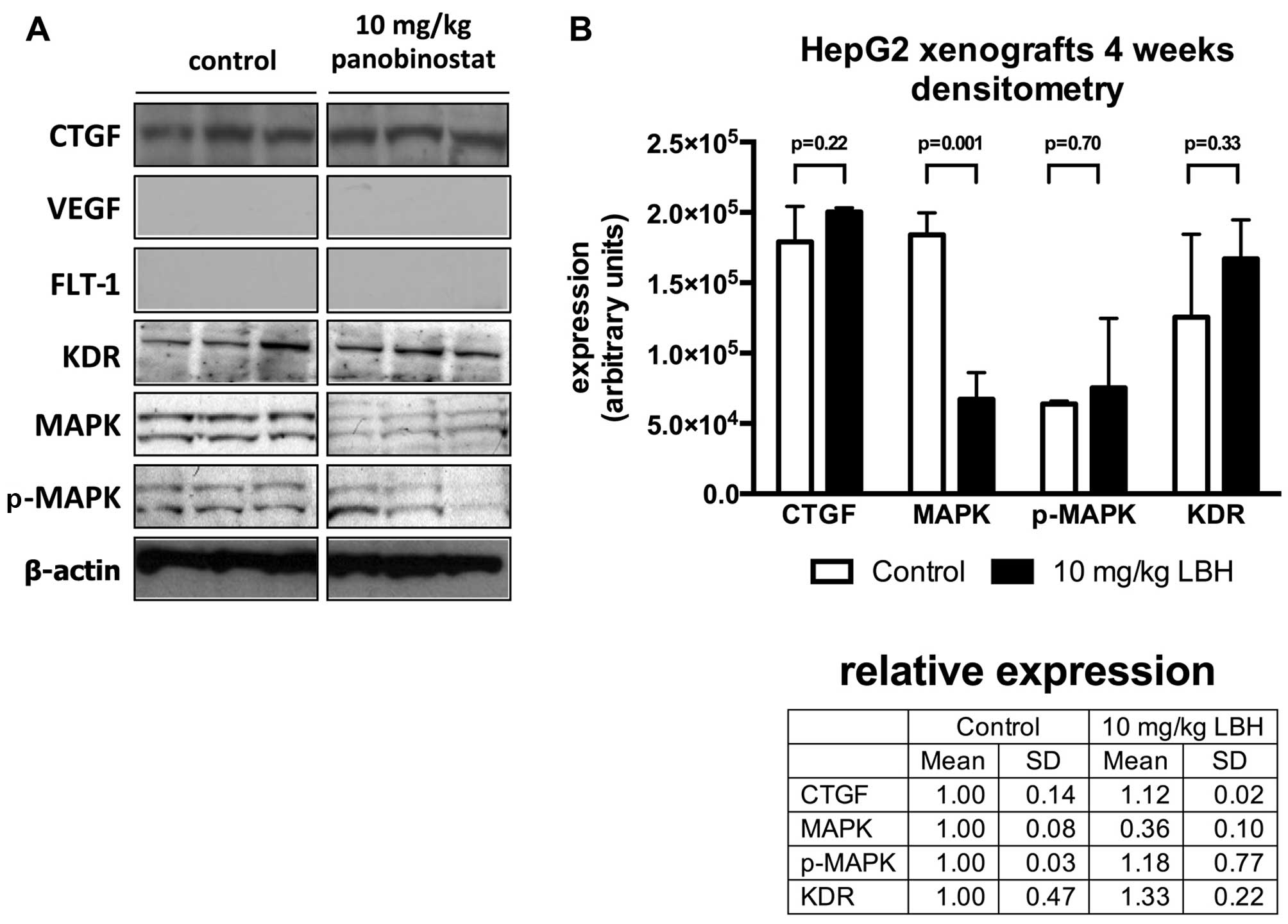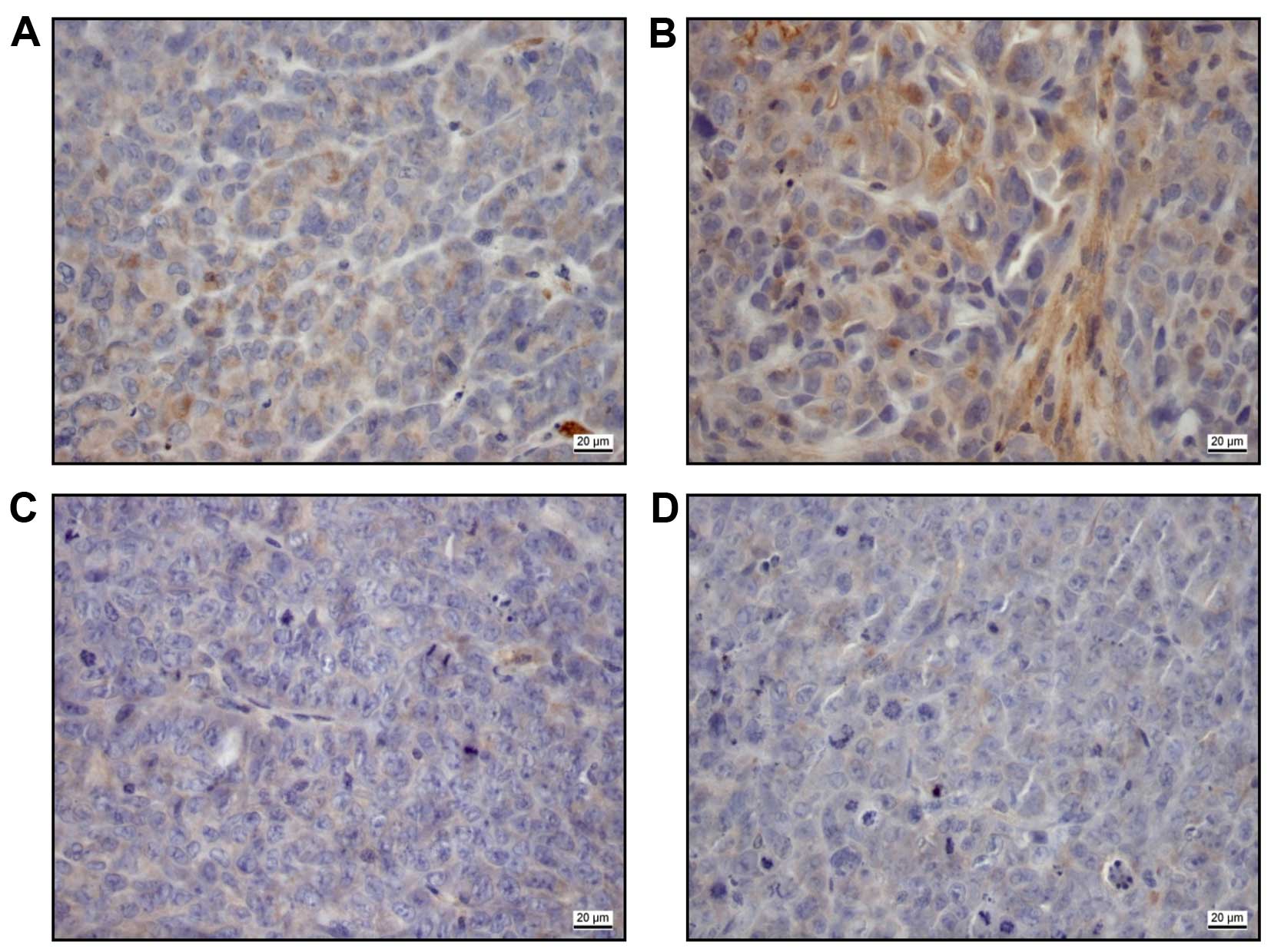|
1
|
Lodato F, Mazzella G, Festi D, Azzaroli F,
Colecchia A and Roda E: Hepatocellular carcinoma prevention: A
worldwide emergence between the opulence of developed countries and
the economic constraints of developing nations. World J
Gastroenterol. 12:7239–7249. 2006.PubMed/NCBI
|
|
2
|
Bosch FX, Ribes J, Díaz M and Cléries R:
Primary liver cancer: Worldwide incidence and trends.
Gastroenterology. 127(Suppl 1): S5–S16. 2004. View Article : Google Scholar : PubMed/NCBI
|
|
3
|
Peto J: Cancer epidemiology in the last
century and the next decade. Nature. 411:390–395. 2001. View Article : Google Scholar : PubMed/NCBI
|
|
4
|
Siegel R, Ma J, Zou Z and Jemal A: Cancer
statistics, 2014. CA Cancer J Clin. 64:9–29. 2014. View Article : Google Scholar : PubMed/NCBI
|
|
5
|
Duffy A and Greten T: Developing better
treatments in hepatocellular carcinoma. Expert Rev Gastroenterol
Hepatol. 4:551–560. 2010. View Article : Google Scholar : PubMed/NCBI
|
|
6
|
Omata M, Tateishi R, Yoshida H and Shiina
S: Treatment of hepatocellular carcinoma by percutaneous tumor
ablation methods: Ethanol injection therapy and radiofrequency
ablation. Gastroenterology. 127(Suppl 1): S159–S166. 2004.
View Article : Google Scholar : PubMed/NCBI
|
|
7
|
Llovet JM, Ricci S, Mazzaferro V, Hilgard
P, Gane E, Blanc JF, de Oliveira AC, Santoro A, Raoul JL, Forner A,
et al; SHARP Investigators Study Group. Sorafenib in advanced
hepatocellular carcinoma. N Engl J Med. 359:378–390. 2008.
View Article : Google Scholar : PubMed/NCBI
|
|
8
|
Okamoto K, Neureiter D and Ocker M:
Biomarkers for novel targeted therapies of hepatocellular
carcinoma. Histol Histopathol. 24:493–502. 2009.PubMed/NCBI
|
|
9
|
Chan SL, Mok T and Ma BB: Management of
hepatocellular carcinoma: Beyond sorafenib. Curr Oncol Rep.
14:257–266. 2012. View Article : Google Scholar : PubMed/NCBI
|
|
10
|
Hanahan D and Weinberg RA: Hallmarks of
cancer: The next generation. Cell. 144:646–674. 2011. View Article : Google Scholar : PubMed/NCBI
|
|
11
|
Sakurai T and Kudo M: Signaling pathways
governing tumor angiogenesis. Oncology. 81(Suppl 1): 24–29. 2011.
View Article : Google Scholar
|
|
12
|
Weis SM and Cheresh DA: Tumor
angiogenesis: Molecular pathways and therapeutic targets. Nat Med.
17:1359–1370. 2011. View
Article : Google Scholar : PubMed/NCBI
|
|
13
|
Ichihara E, Kiura K and Tanimoto M:
Targeting angiogenesis in cancer therapy. Acta Med Okayama.
65:353–362. 2011.PubMed/NCBI
|
|
14
|
Hicklin DJ and Ellis LM: Role of the
vascular endothelial growth factor pathway in tumor growth and
angiogenesis. J Clin Oncol. 23:1011–1027. 2005. View Article : Google Scholar
|
|
15
|
Chung AS, Lee J and Ferrara N: Targeting
the tumour vasculature: Insights from physiological angiogenesis.
Nat Rev Cancer. 10:505–514. 2010. View
Article : Google Scholar : PubMed/NCBI
|
|
16
|
Shibuya M: Vascular endothelial growth
factor-dependent and -independent regulation of angiogenesis. BMB
Rep. 41:278–286. 2008. View Article : Google Scholar : PubMed/NCBI
|
|
17
|
Veeravagu A, Hsu AR, Cai W, Hou LC, Tse VC
and Chen X: Vascular endothelial growth factor and vascular
endothelial growth factor receptor inhibitors as anti-angiogenic
agents in cancer therapy. Recent Patents Anticancer Drug Discov.
2:59–71. 2007. View Article : Google Scholar
|
|
18
|
Amaoka N, Saio M, Nonaka K, Imai H, Tomita
H, Sakashita F, Takahashi T, Sugiyama Y, Takami T and Adachi Y:
Expression of vascular endothelial growth factor receptors is
closely related to the histological grade of hepatocellular
carcinoma. Oncol Rep. 16:3–10. 2006.PubMed/NCBI
|
|
19
|
Kanno S, Oda N, Abe M, Terai Y, Ito M,
Shitara K, Tabayashi K, Shibuya M and Sato Y: Roles of two VEGF
receptors, Flt-1 and KDR, in the signal transduction of VEGF
effects in human vascular endothelial cells. Oncogene.
19:2138–2146. 2000. View Article : Google Scholar : PubMed/NCBI
|
|
20
|
Ferrara N, Gerber HP and LeCouter J: The
biology of VEGF and its receptors. Nat Med. 9:669–676. 2003.
View Article : Google Scholar : PubMed/NCBI
|
|
21
|
Schoenleber SJ, Kurtz DM, Talwalkar JA,
Roberts LR and Gores GJ: Prognostic role of vascular endothelial
growth factor in hepatocellular carcinoma: Systematic review and
meta-analysis. Br J Cancer. 100:1385–1392. 2009. View Article : Google Scholar : PubMed/NCBI
|
|
22
|
Sato Y, Kanno S, Oda N, Abe M, Ito M,
Shitara K and Shibuya M: Properties of two VEGF receptors, Flt-1
and KDR, in signal transduction. Ann NY Acad Sci. 902:201–207.
2000. View Article : Google Scholar : PubMed/NCBI
|
|
23
|
Greten TF, Korangy F, Manns MP and Malek
NP: Molecular therapy for the treatment of hepatocellular
carcinoma. Br J Cancer. 100:19–23. 2009. View Article : Google Scholar :
|
|
24
|
Carr BI, Carroll S, Muszbek N and Gondek
K: Economic evaluation of sorafenib in unresectable hepatocellular
carcinoma. J Gastroenterol Hepatol. 25:1739–1746. 2010. View Article : Google Scholar : PubMed/NCBI
|
|
25
|
Connock M, Round J, Bayliss S, Tubeuf S,
Greenheld W and Moore D: Sorafenib for the treatment of advanced
hepatocellular carcinoma. Health Technol Assess. 14(Suppl 1):
17–21. 2010. View Article : Google Scholar : PubMed/NCBI
|
|
26
|
Bergers G and Benjamin LE: Tumorigenesis
and the angiogenic switch. Nat Rev Cancer. 3:401–410. 2003.
View Article : Google Scholar : PubMed/NCBI
|
|
27
|
Baeriswyl V and Christofori G: The
angiogenic switch in carcinogenesis. Semin Cancer Biol. 19:329–337.
2009. View Article : Google Scholar : PubMed/NCBI
|
|
28
|
Bradham DM, Igarashi A, Potter RL and
Grotendorst GR: Connective tissue growth factor: A cysteine-rich
mitogen secreted by human vascular endothelial cells is related to
the SRC-induced immediate early gene product CEF-10. J Cell Biol.
114:1285–1294. 1991. View Article : Google Scholar : PubMed/NCBI
|
|
29
|
Shimo T, Nakanishi T, Nishida T, Asano M,
Kanyama M, Kuboki T, Tamatani T, Tezuka K, Takemura M, Matsumura T,
et al: Connective tissue growth factor induces the proliferation,
migration, and tube formation of vascular endothelial cells in
vitro, and angiogenesis in vivo. J Biochem. 126:137–145. 1999.
View Article : Google Scholar : PubMed/NCBI
|
|
30
|
Perbal B: NOV (nephroblastoma
overexpressed) and the CCN family of genes: Structural and
functional issues. Mol Pathol. 54:57–79. 2001. View Article : Google Scholar : PubMed/NCBI
|
|
31
|
Li MH, Sanchez T, Pappalardo A, Lynch KR,
Hla T and Ferrer F: Induction of antiproliferative connective
tissue growth factor expression in Wilms' tumor cells by
sphingosine-1-phosphate receptor 2. Mol Cancer Res. 6:1649–1656.
2008.PubMed/NCBI
|
|
32
|
Hall-Glenn F, De Young RA, Huang BL, van
Handel B, Hofmann JJ, Chen TT, Choi A, Ong JR, Benya PD, Mikkola H,
et al: CCN2/connective tissue growth factor is essential for
pericyte adhesion and endothelial basement membrane formation
during angiogenesis. PLoS One. 7:e305622012. View Article : Google Scholar : PubMed/NCBI
|
|
33
|
Moussad EE and Brigstock DR: Connective
tissue growth factor: What's in a name? Mol Genet Metab.
71:276–292. 2000. View Article : Google Scholar : PubMed/NCBI
|
|
34
|
Urtasun R, Latasa MU, Demartis MI, Balzani
S, Goñi S, Garcia-Irigoyen O, Elizalde M, Azcona M, Pascale RM, Feo
F, et al: Connective tissue growth factor autocriny in human
hepatocellular carcinoma: Oncogenic role and regulation by
epidermal growth factor receptor/yes-associated protein-mediated
activation. Hepatology. 54:2149–2158. 2011. View Article : Google Scholar : PubMed/NCBI
|
|
35
|
Wang GB, Zhou XY, Yuan T, Xie J, Guo LP,
Gao N and Wang XQ: Significance of serum connective tissue growth
factor in patients with hepatocellular carcinoma and relationship
with angiogenesis. World J Surg. 34:2411–2417. 2010. View Article : Google Scholar : PubMed/NCBI
|
|
36
|
Hirasaki S, Koide N, Ujike K, Shinji T and
Tsuji T: Expression of Nov, CYR61 and CTGF genes in human
hepatocellular carcinoma. Hepatol Res. 19:294–305. 2001. View Article : Google Scholar : PubMed/NCBI
|
|
37
|
Zeng ZJ, Yang LY, Ding X and Wang W:
Expressions of cysteine-rich61, connective tissue growth factor and
Nov genes in hepatocellular carcinoma and their clinical
significance. World J Gastroenterol. 10:3414–3418. 2004.PubMed/NCBI
|
|
38
|
Xiu M, Liu YH, Brigstock DR, He FH, Zhang
RJ and Gao RP: Connective tissue growth factor is overexpressed in
human hepatocellular carcinoma and promotes cell invasion and
growth. World J Gastroenterol. 18:7070–7078. 2012. View Article : Google Scholar
|
|
39
|
Komorowsky C, Ocker M and Goppelt-Struebe
M: Differential regulation of connective tissue growth factor in
renal cells by histone deacetylase inhibitors. J Cell Mol Med.
13:2353–2364. 2009. View Article : Google Scholar
|
|
40
|
Schneider-Stock R and Ocker M: Epigenetic
therapy in cancer: Molecular background and clinical development of
histone deacetylase and DNA methyltransferase inhibitors. IDrugs.
10:557–561. 2007.PubMed/NCBI
|
|
41
|
Di Fazio P, Schneider-Stock R, Neureiter
D, Okamoto K, Wissniowski T, Gahr S, Quint K, Meissnitzer M,
Alinger B, Montalbano R, et al: The pan-deacetylase inhibitor
panobinostat inhibits growth of hepatocellular carcinoma models by
alternative pathways of apoptosis. Cell Oncol. 32:285–300.
2010.PubMed/NCBI
|
|
42
|
Lachenmayer A, Toffanin S, Cabellos L,
Alsinet C, Hoshida Y, Villanueva A, Minguez B, Tsai HW, Ward SC,
Thung S, et al: Combination therapy for hepatocellular carcinoma:
Additive preclinical efficacy of the HDAC inhibitor panobinostat
with sorafenib. J Hepatol. 56:1343–1350. 2012. View Article : Google Scholar : PubMed/NCBI
|
|
43
|
Gahr S, Wissniowski T, Zopf S, Strobel D,
Pustowka A and Ocker M: Combination of the deacetylase inhibitor
panobinostat and the multi-kinase inhibitor sorafenib for the
treatment of metastatic hepatocellular carcinoma - review of the
underlying molecular mechanisms and first case report. J Cancer.
3:158–165. 2012. View Article : Google Scholar : PubMed/NCBI
|
|
44
|
Di Fazio P, Montalbano R, Neureiter D,
Alinger B, Schmidt A, Merkel AL, Quint K and Ocker M:
Downregulation of HMGA2 by the pan-deacetylase inhibitor
panobinostat is dependent on hsa-let-7b expression in liver cancer
cell lines. Exp Cell Res. 318:1832–1843. 2012. View Article : Google Scholar : PubMed/NCBI
|
|
45
|
Qian DZ, Kato Y, Shabbeer S, Wei Y,
Verheul HM, Salumbides B, Sanni T, Atadja P and Pili R: Targeting
tumor angiogenesis with histone deacetylase inhibitors: The
hydroxamic acid derivative LBH589. Clin Cancer Res. 12:634–642.
2006. View Article : Google Scholar : PubMed/NCBI
|
|
46
|
Ocker M: Deacetylase inhibitors - focus on
non-histone targets and effects. World J Biol Chem. 1:55–61. 2010.
View Article : Google Scholar
|
|
47
|
Ellis L, Hammers H and Pili R: Targeting
tumor angiogenesis with histone deacetylase inhibitors. Cancer
Lett. 280:145–153. 2009. View Article : Google Scholar
|
|
48
|
Livak KJ and Schmittgen TD: Analysis of
relative gene expression data using real-time quantitative PCR and
the 2(−Delta Delta C(T)) method. Methods. 25:402–408. 2001.
View Article : Google Scholar
|
|
49
|
Zuehlke J, Ebenau A, Krueger B and
Goppelt-Struebe M: Vectorial secretion of CTGF as a cell-type
specific response to LPA and TGF-β in human tubular epithelial
cells. Cell Commun Signal. 10:252012. View Article : Google Scholar
|
|
50
|
Saif MW: Anti-VEGF agents in metastatic
colorectal cancer (mCRC): Are they all alike? Cancer Manag Res.
5:103–115. 2013. View Article : Google Scholar : PubMed/NCBI
|
|
51
|
Gahr S, Peter G, Wissniowski TT, Hahn EG,
Herold C and Ocker M: The histone-deacetylase inhibitor MS-275 and
the CDK-inhibitor CYC-202 promote anti-tumor effects in hepatoma
cell lines. Oncol Rep. 20:1249–1256. 2008.PubMed/NCBI
|
|
52
|
Gahr S, Ocker M, Ganslmayer M, Zopf S,
Okamoto K, Hartl A, Leitner S, Hahn EG and Herold C: The
combination of the histone-deacetylase inhibitor trichostatin A and
gemcitabine induces inhibition of proliferation and increased
apoptosis in pancreatic carcinoma cells. Int J Oncol. 31:567–576.
2007.PubMed/NCBI
|
|
53
|
Budman DR, Tai J, Calabro A and John V:
The histone deacetylase inhibitor panobinostat demonstrates marked
synergy with conventional chemotherapeutic agents in human ovarian
cancer cell lines. Invest New Drugs. 29:1224–1229. 2011. View Article : Google Scholar
|
|
54
|
Neri P, Bahlis NJ and Lonial S:
Panobinostat for the treatment of multiple myeloma. Expert Opin
Investig Drugs. 21:733–747. 2012. View Article : Google Scholar : PubMed/NCBI
|
|
55
|
Simmons JK, Patel J, Michalowski A, Zhang
S, Wei BR, Sullivan P, Gamache B, Felsenstein K, Kuehl WM and
Simpson RM: TORC1 and class I HDAC inhibitors synergize to suppress
mature B cell neoplasms. Mol Oncol. 8:261–272. 2014. View Article : Google Scholar : PubMed/NCBI
|
|
56
|
Antonarakis ES and Carducci MA: Targeting
angiogenesis for the treatment of prostate cancer. Expert Opin Ther
Targets. 16:365–376. 2012. View Article : Google Scholar : PubMed/NCBI
|
|
57
|
Schweizer MT and Carducci MA: From
bevacizumab to tasquinimod: angiogenesis as a therapeutic target in
prostate cancer. Cancer J. 19:99–106. 2013. View Article : Google Scholar : PubMed/NCBI
|
|
58
|
Liu TJ, Sun BC, Zhao XL, Zhao XM, Sun T,
Gu Q, Yao Z, Dong XY, Zhao N and Liu N: CD133+ cells
with cancer stem cell characteristics associates with vasculogenic
mimicry in triple-negative breast cancer. Oncogene. 32:544–553.
2013. View Article : Google Scholar
|
|
59
|
Zhang Y, Hong H, Nayak TR, Valdovinos HF,
Myklejord DV, Theuer CP, Barnhart TE and Cai W: Imaging tumor
angiogenesis in breast cancer experimental lung metastasis with
positron emission tomography, near-infrared fluorescence, and
bioluminescence. Angiogenesis. 16:663–674. 2013. View Article : Google Scholar : PubMed/NCBI
|
|
60
|
Aggarwal C, Somaiah N and Simon G:
Antiangiogenic agents in the management of non-small cell lung
cancer: Where do we stand now and where are we headed? Cancer Biol
Ther. 13:247–263. 2012. View Article : Google Scholar : PubMed/NCBI
|
|
61
|
Xiao YY, Zhan P, Yuan DM, Liu HB, Lv TF,
Song Y and Shi Y: Chemotherapy plus multitargeted antiangiogenic
tyrosine kinase inhibitors or chemotherapy alone in advanced NSCLC:
A meta-analysis of randomized controlled trials. Eur J Clin
Pharmacol. 69:151–159. 2013. View Article : Google Scholar
|
|
62
|
Pang R, Tse E and Poon RT: Molecular
pathways in hepatocellular carcinoma. Cancer Lett. 240:157–169.
2006. View Article : Google Scholar
|
|
63
|
Ribatti D, Vacca A, Nico B, Sansonno D and
Dammacco F: Angiogenesis and anti-angiogenesis in hepatocellular
carcinoma. Cancer Treat Rev. 32:437–444. 2006. View Article : Google Scholar : PubMed/NCBI
|
|
64
|
Zhang Q, Du Y, Xue Z, Chi C, Jia X and
Tian J: Comprehensive evaluation of the anti-angiogenic and
anti-neoplastic effects of Endostar on liver cancer through optical
molecular imaging. PLoS One. 9:e855592014. View Article : Google Scholar : PubMed/NCBI
|
|
65
|
Carmeliet P: Angiogenesis in life, disease
and medicine. Nature. 438:932–936. 2005. View Article : Google Scholar : PubMed/NCBI
|
|
66
|
Fischer C, Schneider M and Carmeliet P:
Principles and therapeutic implications of angiogenesis,
vasculogenesis and arteriogenesis. Handb Exp Pharmacol.
176:157–212. 2006. View Article : Google Scholar : PubMed/NCBI
|
|
67
|
Lin EY and Pollard JW: Tumor-associated
macrophages press the angiogenic switch in breast cancer. Cancer
Res. 67:5064–5066. 2007. View Article : Google Scholar : PubMed/NCBI
|
|
68
|
Inoki I, Shiomi T, Hashimoto G, Enomoto H,
Nakamura H, Makino K, Ikeda E, Takata S, Kobayashi K and Okada Y:
Connective tissue growth factor binds vascular endothelial growth
factor (VEGF) and inhibits VEGF-induced angiogenesis. FASEB J.
16:219–221. 2002.
|
|
69
|
Hashimoto G, Inoki I, Fujii Y, Aoki T,
Ikeda E and Okada Y: Matrix metalloproteinases cleave connective
tissue growth factor and reactivate angiogenic activity of vascular
endothelial growth factor 165. J Biol Chem. 277:36288–36295. 2002.
View Article : Google Scholar : PubMed/NCBI
|
|
70
|
Shimo T, Nakanishi T, Kimura Y, Nishida T,
Ishizeki K, Matsumura T and Takigawa M: Inhibition of endogenous
expression of connective tissue growth factor by its antisense
oligonucleotide and antisense RNA suppresses proliferation and
migration of vascular endothelial cells. J Biochem. 124:130–140.
1998. View Article : Google Scholar : PubMed/NCBI
|
|
71
|
Babic AM, Chen CC and Lau LF: Fisp12/mouse
connective tissue growth factor mediates endothelial cell adhesion
and migration through integrin alphavbeta3, promotes endothelial
cell survival, and induces angiogenesis in vivo. Mol Cell Biol.
19:2958–2966. 1999.PubMed/NCBI
|



















